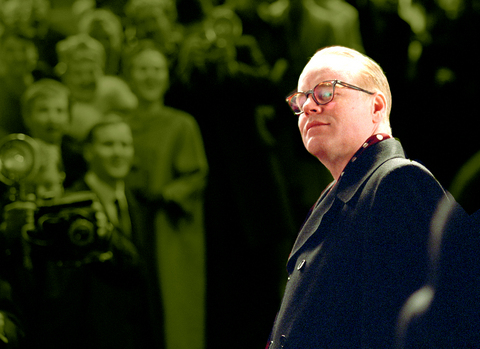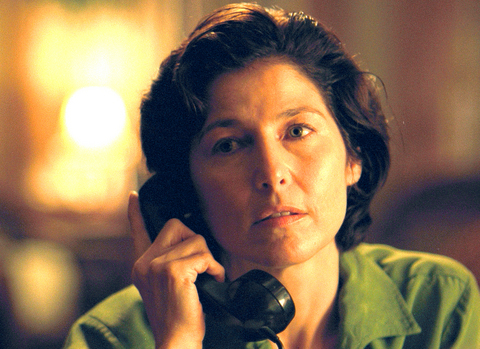In 1959, a newspaper article about the murder of the Clutter family in the tiny town of Holcomb, Kansas, caught the eye of the novelist Truman Capote. He spent most of the next half-dozen years following the case, which ended with the execution of Dick Hickock and Perry Smith and the subsequent publication of In Cold Blood, Capote's best-selling mutation of the true crime potboiler into bona fide literature.
Bennett Miller's Capote is a fascinating and fine-grained reconstruction of that period in its subject's life, a time when he pursued literary glory and flirted with moral ruin. "This is the beginning of a great love affair -- between Truman and himself," someone says, but the film suggests that Capote's obsession with the Clutter murders, and his drive to alchemize their ugly pointlessness into deathless prose, might better be described as a Faustian bargain.
In any case, Capote is, principally, the story of a writer's vexed, all-consuming relationship with his work, and therefore with himself. This makes for better drama than you might expect. Capote's human connections are, for the most part, secondary and instrumental, which makes Philip Seymour Hoffman's performance all the more remarkable, since he must connect with the audience without piercing the membrane of his character's narcissism. Not only does Hoffman achieve an impressive physical and vocal transformation -- mimicking Capote's chirpy drawl and appearing to shrink to his elfin stature -- but he also conveys, with clarity and subtlety, the complexities of Capote's temperament.

PHOTOS: AP
"It appears that with his curious voice, his ways, he decided to brazen it out, to be himself with an ornamental courage and an impressive conceit," Elizabeth Hardwick once wrote, and Hoffman bears out her insight. There is neediness and vulnerability to Hoffman's Capote, but his dominant traits are guile, vanity and the self-confident toughness of the outsider.
A gay man in the era of Kennedy/Rat Pack machismo, a Southerner in New York, a New Yorker in Kansas, he walks into every new situation sure of who he is and sure that he will soon prove himself to be, once again, the most interesting person in the room. His whispery, stuttering self-presentation serves as a feint, deflecting notice from his essential steeliness. Prefiguring the talk show and tabloid self-parody he would later become, this Capote drinks, gossips, teases and whines, but mostly he works, with methodical intensity and ruthless discipline.
The movie's deep subject, crisply delineated in Dan Futterman's fine script (drawn from Gerald Clarke's biography) and dramatized without undue didacticism by Miller, is the risk and cost of this work. Following a hunch, Capote persuades William Shawn, editor of The New Yorker (played by Bob Balaban), to send him to Kansas. He brings along his childhood friend, Nelle Harper Lee (Catherine Keener), to be his "research assistant and personal bodyguard," and the two of them, using New York glamour, Southern charm and Scotch whiskey, try to separate the residents of Holcomb from their natural reticence. They interview friends of the Clutters and befriend the lead investigator on the case, Alvin Dewey (Chris Cooper), and his star-struck wife, Marie (the wonderful Amy Ryan), who even in the wake of an appalling crime cannot contain her delight at having a famous writer in her living room.

All of these characters -- as well as Jack Dunphy (Bruce Greenwood), Capote's longtime lover -- are supporting players in the Truman show, enduring his egoism with stoical good humor and occasional impatience. Keener performs the role of foil with particular grace. Through her wary, witty performance, she becomes the bridge that connects Capote with the audience: we take our cues from her as we try to figure out when he should be indulged and when he should be censured.
Both Keener's character and Greenwood's are novelists in their own right, something Capote seems only vaguely and intermittently aware of, less and less so as In Cold Blood takes over his life. As it does, his other relationships are overshadowed by his fascination with Perry Smith (Clifton Collins Jr.), whose story Capote believes will be the key to the book and whose sensitive, sociopathic temperament is the dark mirror-image of his own. If Hoffman must address the challenge of impersonating a real, well-known person, Collins has to face the more complicated task of incarnating a real, obscure person who is also a character in a "nonfiction novel" and in a previous film (Richard Brooks's 1967 adaptation of In Cold Blood, in which Smith was played by Robert Blake).
Perhaps because of this, Smith never quite achieves full human gravity. He is caught between whoever he was before he met Capote and the literary figure into which Capote made him. Still, in dramatizing this process -- in showing how Smith was seduced, betrayed and immortalized by the writer's attention -- Capote unflinchingly faces the moral abyss at the heart of the journalistic enterprise. Capote's disinclination to help in Smith's and Hickock's judicial appeals, allegedly because only their deaths would allow him the ending he needed, has long been part of his legend. The filmmakers neither let him off the hook nor turn him into a scapegoat, preferring to view him with a full and appropriate measure of ambiguity.
In setting out for Kansas, Capote believed himself to be tracing the violent intersection of "two Americas": the conservative, stable world of the Clutters and the lawless underworld represented by their killers. That may be the theme of In Cold Blood, but the collision portrayed in Capote -- the cultural friction that gives it a frisson of contemporary relevance -- is a rather different one, between everyday American life and death and the equally American machinery that turns it into news, spectacle and sometimes art.

June 23 to June 29 After capturing the walled city of Hsinchu on June 22, 1895, the Japanese hoped to quickly push south and seize control of Taiwan’s entire west coast — but their advance was stalled for more than a month. Not only did local Hakka fighters continue to cause them headaches, resistance forces even attempted to retake the city three times. “We had planned to occupy Anping (Tainan) and Takao (Kaohsiung) as soon as possible, but ever since we took Hsinchu, nearby bandits proclaiming to be ‘righteous people’ (義民) have been destroying train tracks and electrical cables, and gathering in villages

This year will go down in the history books. Taiwan faces enormous turmoil and uncertainty in the coming months. Which political parties are in a good position to handle big changes? All of the main parties are beset with challenges. Taking stock, this column examined the Taiwan People’s Party (TPP) (“Huang Kuo-chang’s choking the life out of the TPP,” May 28, page 12), the Democratic Progressive Party (DPP) (“Challenges amid choppy waters for the DPP,” June 14, page 12) and the Chinese Nationalist Party (KMT) (“KMT struggles to seize opportunities as ‘interesting times’ loom,” June 20, page 11). Times like these can

Dr. Y. Tony Yang, Associate Dean of Health Policy and Population Science at George Washington University, argued last week in a piece for the Taipei Times about former president Ma Ying-jeou (馬英九) leading a student delegation to the People’s Republic of China (PRC) that, “The real question is not whether Ma’s visit helps or hurts Taiwan — it is why Taiwan lacks a sophisticated, multi-track approach to one of the most complex geopolitical relationships in the world” (“Ma’s Visit, DPP’s Blind Spot,” June 18, page 8). Yang contends that the Democratic Progressive Party (DPP) has a blind spot: “By treating any

Swooping low over the banks of a Nile River tributary, an aid flight run by retired American military officers released a stream of food-stuffed sacks over a town emptied by fighting in South Sudan, a country wracked by conflict. Last week’s air drop was the latest in a controversial development — private contracting firms led by former US intelligence officers and military veterans delivering aid to some of the world’s deadliest conflict zones, in operations organized with governments that are combatants in the conflicts. The moves are roiling the global aid community, which warns of a more militarized, politicized and profit-seeking trend